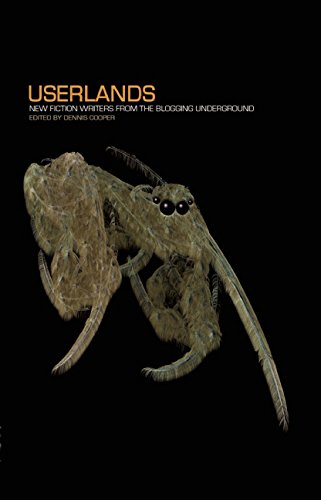I wanted Userlands to be confusing and tedious, “overly digital but always disturbing and loud,” in the words of contributor Robert Siek, or emblematic of writing that accounts for technology’s conversion of humans into networked entities, our “very bloodstream a hybrid of zeros, ones, and hemoglobin,” as contributor Mike Kascel sees it. But, like most anthologies, Userlands is hit or miss.
Many of these stories are short, like exercises, and while even certain of the lackluster tales have moments of lively scene-writing or evocative turns of phrase, this collection is more about writing as an emotional release than writing for the sake of storytelling. Because of that, it is interesting for what it reveals about our relationship to words on screens, even when those words have been corralled on paper.
We are certainly a screen-dependent culture; screens are the conduits through which we glean ideas and aspects of reality.The future of reading and writing is poised to change (once again) because of technology, and Userlands claims to document the process. In actuality, no traditional codex book can really achieve such a feat as it would require hyperlinking and multimedia treatments that are about much more than ink on paper.
Some of these stories read like blogs; they mention Pitchfork, reality television, and war. Others are personal prose-poetry-esque meanderings, early stabs at unshackling language from its confines, lathering it up into bubbly, playful sentences that wend through all of the expected themes: love, loss, sex, isolation, violence, and drugs. Lots and lots of drugs.
“Mine,” one of the strongest pieces, is sick with the intimacy created during a weekend of basement-imprisonment-domination replete with blood, blades, and penetration. Here, the undercurrent of violence most of the stories contain is fully realized. Too often in this collection, the violence is poppy, like Pulp Fiction violence, isolating because it favors a solipsism that denies empathy, reducing too many of the characters to mere sketches. In “Mine,” however, Jack Dickson renders two depraved individuals complicit in their vices of redemptive humility, making you want to know such caring, even when it is crusty, stained, and bruised with endearment. You admire the “irrational impulse to set off, track down, then beat to a pulp those who have hurt [them]” as it “vies with the desire to… murmur meaningless inanities about how it’s all going to be all right.”
What all these stories make clear is that none of the writers believe everything will be all right. We populate this pixilated, fragmented, habit-forming landscape that is the Userlands and its jump-cut, scrolling, flickering tension is ever present but ignored. Perhaps it is something yet to be fully reckoned. Callum James encapsulates how the shortcomings of these stories provide the most insight into the cultural conditions that produce these writers, and their readers: “Tomorrow I will stop looking so closely at the world, because, unlike you, I understand it’s a dangerous thing to do.”
Writing is an act of removal, though when it is done well, that distance grants great perspective. Though writers access one another’s work faster and from greater distances than ever before, there is a disconnect in Userlands that yawns out into this blank chasm where too much detail and understanding seem to be avoided, or inaccessible, something we can’t handle.





